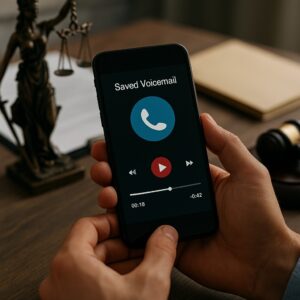Family disputes can be emotionally charged, and when legal proceedings are involved, even the smallest details may carry weight. Something as simple as a voicemail, often overlooked in daily life, can later emerge as a crucial piece of evidence. In custody battles or divorce trials, recordings of conversations have the power to either strengthen a parent’s case or undermine it completely. Whether it becomes a weapon or a lifeline depends on the words spoken, the tone used, and the context in which it is presented. Working with an experienced McKinney child custody lawyer can help ensure such evidence is used strategically and lawfully.

The Power of a Recorded Message
Voicemails capture raw emotion in real time. Unlike written messages, they preserve tone, volume, hesitation, or anger; subtle elements that can influence how a judge perceives intent and character. For example, a parent who leaves threatening or disparaging voicemails may unintentionally reveal behavior patterns that affect custody decisions. Conversely, consistent voicemails filled with calm reassurance and responsibility may help establish a narrative of stability and care.
Judges often look beyond claims and counterclaims; they examine the evidence to understand which environment best serves the child’s welfare. In this regard, voicemails serve as a unique, unfiltered glimpse into how parents actually communicate when tensions rise.
When a Voicemail Becomes a Weapon
A single voicemail can sometimes outweigh countless pages of testimony. An angry outburst, disparaging remarks about the other parent, or threats left on a recording can be introduced as evidence of instability. What may have felt like a fleeting moment of frustration to the speaker can later be replayed multiple times in a courtroom, magnifying its impact.
The danger lies in how these recordings frame behavior. Judges may question whether the parent who left the message is capable of providing a nurturing environment. Even offhand comments like “I don’t care if I ever see the kids again” can drastically affect custody rulings. In such cases, the voicemail becomes a weapon that damages credibility and erodes the parent’s standing in court.
When a Voicemail Becomes a Lifeline
Not all voicemails work against the sender. Sometimes, they provide essential support for a parent’s position. A voicemail apologizing for missed visitation, acknowledging neglectful behavior, or admitting financial irresponsibility can reinforce claims previously dismissed as hearsay. Similarly, recordings where one parent makes consistent efforts to stay connected with their child, even if the other parent resists, can help prove dedication and involvement.
For parents facing false accusations, saved voicemails can become a lifeline. They provide a timestamped, verifiable record that can counter misleading claims. This type of evidence, when properly authenticated and presented, can help balance narratives and ensure a fairer evaluation.
Legal Admissibility of Voicemails
While voicemails can be powerful, they are only helpful if admissible in court. Rules vary by jurisdiction, but most courts require that recordings be legally obtained and relevant to the case. Some states have strict consent laws about recording conversations, but voicemails are typically treated differently since the speaker voluntarily leaves them.
Parents should avoid tampering with or editing recordings, as altered evidence risks being disqualified. A judge is more likely to give weight to an untouched voicemail than to transcripts alone. To avoid missteps, it is best to consult a family law attorney who can advise on admissibility standards and ensure evidence is presented within proper legal boundaries.
Emotional Weight of Hearing One’s Words
Beyond technical admissibility, there is a psychological aspect to voicemails. Unlike text messages or emails, listening to someone’s actual voice can be deeply impactful. In a courtroom, playing a voicemail allows the judge and attorneys to experience not only the words but the emotion behind them. The sound of anger, fear, or tenderness can influence perception in ways a transcript cannot replicate.
This emotional dimension underscores why parents must exercise caution when leaving messages. Every voicemail has the potential to be replayed months or even years later in a legal setting, carrying weight far beyond its original intention.
Guidance for Parents in Custody Disputes
Parents navigating custody disputes should approach communication with caution. Saving voicemails, texts, and written correspondence is often advisable, but leaving impulsive or aggressive messages can be damaging. Working with a trusted McKinney child custody lawyer helps parents understand how to manage and protect this type of evidence.
It is equally important for parents to remember that their communication with the other parent reflects on their ability to co-parent effectively. Professionalism and restraint in voicemails or any communication may ultimately serve the best interests of both the parent and the child.
Ethical Considerations and Best Practices
While voicemails can serve as evidence, there is an ethical layer to their use. Parents must weigh whether presenting a particular recording truly benefits the child or merely harms the other parent. The ultimate goal of custody proceedings is not to “win” at any cost, but to ensure the child’s well-being.
Experts recommend treating every voicemail as if it might someday be replayed in court. Pausing before speaking, choosing words carefully, and maintaining composure can protect against long-term repercussions. This mindful approach not only strengthens a parent’s legal standing but also models healthier communication for children caught in the middle.
Conclusion
Voicemails may feel fleeting in the moment, but in family law cases, they can echo for years. They hold the power to serve as either weapons that damage credibility or lifelines that validate dedication and responsibility. For parents involved in custody disputes, understanding how these recordings might be used in court is crucial. With the guidance of a seasoned McKinney child custody lawyer, parents can navigate this evidence wisely and focus on what truly matters: the well-being of their children.